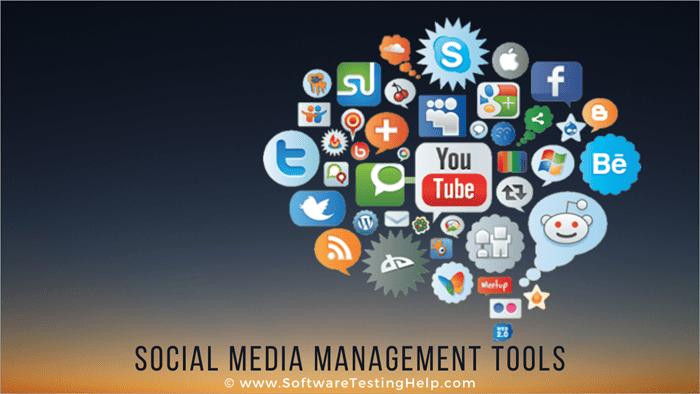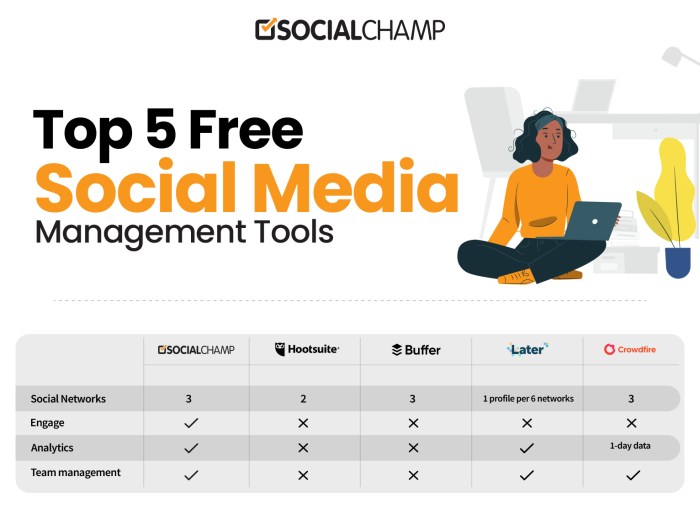With Social Media Management Tools at the forefront, get ready to dive into a world where your online game is about to level up. From scheduling posts to analyzing performance, these tools are your secret weapon in the digital jungle.
Overview of Social Media Management Tools

Social media management tools are essential for businesses and individuals looking to streamline their social media presence across various platforms. These tools help in scheduling posts, analyzing performance, engaging with followers, and managing multiple accounts efficiently.
Purpose of Social Media Management Tools
Social media management tools are designed to simplify the process of managing social media accounts by offering a centralized platform for posting, monitoring, and analyzing content. These tools help in saving time, optimizing social media strategies, and improving overall engagement with the audience.
Key Features of Social Media Management Tools
- Post Scheduling: Allows users to plan and schedule posts in advance, ensuring a consistent presence on social media.
- Analytics: Provides insights into the performance of posts, audience engagement, and growth metrics to make data-driven decisions.
- Social Listening: Monitors mentions, comments, and conversations related to the brand to engage with the audience effectively.
- Content Curation: Helps in discovering relevant content to share with followers, keeping the feed diverse and engaging.
- Team Collaboration: Enables multiple team members to collaborate on social media tasks, ensuring a cohesive strategy.
Popular Social Media Management Tools
- Hootsuite: One of the most widely used social media management tools, offering a comprehensive suite of features for scheduling, monitoring, and analyzing social media activities.
- Buffer: Known for its user-friendly interface and simplicity, Buffer allows users to schedule posts across various platforms easily.
- Sprout Social: Ideal for businesses looking for in-depth analytics and social listening capabilities, Sprout Social offers a robust set of tools for managing social media presence.
- Later: Focused on visual content, Later is perfect for Instagram users looking to schedule and plan their posts effectively, especially for businesses in the visual industry.
Benefits of Using Social Media Management Tools
Using social media management tools can offer numerous advantages to businesses looking to enhance their online presence and engage with their audience more effectively. These tools provide a centralized platform for managing multiple social media accounts, scheduling posts, analyzing performance metrics, and streamlining workflow processes.
Efficient Post Scheduling, Social Media Management Tools
- Allows for scheduling posts in advance, ensuring a consistent and timely presence on various social media platforms.
- Enables businesses to reach their target audience at optimal times, even when the team is not actively online.
- Reduces the need for manual posting, saving time and effort for the social media team.
Performance Analysis
- Provides detailed insights into the performance of social media campaigns, including engagement metrics, reach, and conversions.
- Helps businesses track the effectiveness of their content strategy and make data-driven decisions for future campaigns.
- Identifies trends and patterns in audience behavior, allowing for targeted and personalized marketing efforts.
Workflow Streamlining
- Centralizes all social media accounts in one dashboard, simplifying management and monitoring.
- Facilitates collaboration among team members by assigning roles, setting permissions, and tracking tasks within the tool.
- Automates repetitive tasks such as content curation, response management, and reporting, freeing up time for strategic planning and creative initiatives.
Key Features to Look for in Social Media Management Tools

When choosing a social media management tool, it is important to consider key features that will help streamline your social media strategy and increase engagement with your audience.
Analytics
Analytics are crucial in evaluating the performance of your social media campaigns. Look for tools that offer in-depth analytics, including data on reach, engagement, and follower growth. These insights will help you make informed decisions and optimize your strategy for better results.
Scheduling
Scheduling features allow you to plan and automate your social media posts in advance. This helps you maintain a consistent posting schedule and reach your audience at the most optimal times. Look for tools that offer advanced scheduling options, such as the ability to schedule posts across multiple platforms simultaneously.
Monitoring
Monitoring tools are essential for keeping track of mentions, comments, and messages related to your brand. This allows you to respond promptly to interactions and address any issues or feedback in a timely manner. Look for tools that provide real-time monitoring capabilities and customizable alerts for different types of engagements.
Reporting Capabilities
When comparing different social media management tools, consider their reporting capabilities. Look for tools that offer detailed reports on key metrics, such as engagement rates, click-through rates, and conversion rates. These reports will help you assess the effectiveness of your social media campaigns and make data-driven decisions for future strategies.
Social Listening and Engagement Tools
Social listening tools allow you to monitor conversations and trends related to your industry or brand. This valuable insight can help you better understand your audience and tailor your content to meet their needs. Engagement tools, on the other hand, help you interact with your audience through likes, comments, and direct messages. Look for tools that offer both social listening and engagement features to enhance your social media presence.
Tips for Choosing the Right Social Media Management Tool
When it comes to selecting the perfect social media management tool for your business, there are several key factors to consider. From evaluating your needs to assessing budget and user-friendliness, each step plays a crucial role in making the right choice.
Evaluate Your Business Needs
- Start by identifying your business goals and objectives for social media marketing.
- Consider the size of your business and the number of social media accounts you need to manage.
- Assess the level of engagement and analytics you require to measure your social media performance.
Consider Budget, Scalability, and Integration
- Define your budget and explore the pricing options offered by different social media management tools.
- Look for a tool that can scale with your business as it grows to ensure long-term usability.
- Check if the tool integrates seamlessly with other tools and platforms you currently use for marketing.
Evaluate User-Friendliness and Customer Support
- Test the usability of the tool through a demo or trial version to ensure it fits your team’s workflow.
- Consider the level of customer support provided by the tool’s team in case you encounter any issues or need assistance.
- Read reviews and seek recommendations from other users to gauge the overall satisfaction with user-friendliness and support.
